Beyond Limits: Exploring Smart Communication Capping
In this comprehensive guide, we explore why communication capping matters and how smart communication capping maximizes engagement, marketing ROI, and compliance.
Why Communication Capping Matters
In today’s landscape, customers can be overwhelmed with marketing messages across multiple channels. In our 2024 study of 234 consumers across the United States, over two-thirds of respondents said they prefer email to any other channel to receive marketing communications. Newer channels such as SMS, push notifications, and social media are gaining ground and have caught up to the preference for old-school direct mail.
Our study revealed that consumers generally find value in marketing communications; however, as the frequency of communication increases, consumers can begin to feel overwhelmed and annoyed. When consumers reach their limit, they may start to disengage from the brand entirely, damaging or undermining marketing campaign ROI. On the flip side, if consumers aren’t communicated with often enough, marketers risk leaving money on the table.
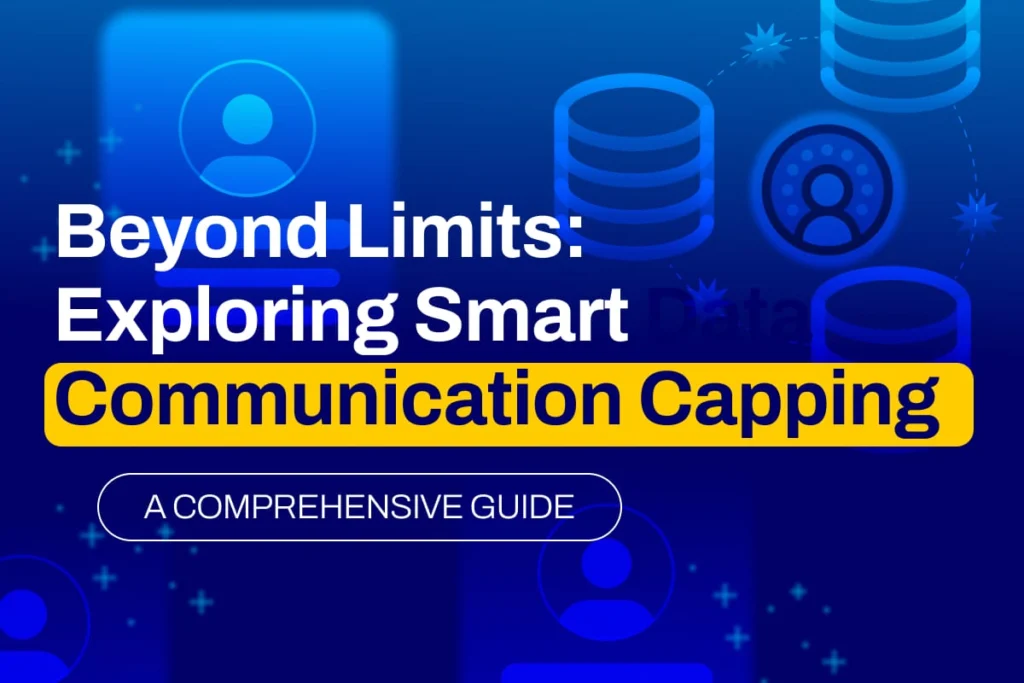
Marketing campaigns often fall short as revenue drivers because they don’t prioritize customer engagement effectively.
Overwhelming contacts with excessive communications can lead to marketing fatigue (resulting in costly unsubscribe and disengagement rates), wasted resources, and increased compliance risks. These issues are particularly severe in large organizations with multiple Business Units (BUs), where a holistic view of planned communications, subscriber behavior, and enforcement of consistent campaign rules are lacking. Let’s look at each of these three detrimental outcomes:
Marketing Fatigue
While brands aim to stay top-of-mind, excessive communication can lead to message fatigue, higher unsubscribe rates, and compliance risks. While roughly half of the consumers in our study were satisfied with the quantity of messages they received each day, the other half felt marketing fatigue, and 12 percent of that group felt they were saturated, or totally overwhelmed by marketing messages. There is a major gap between subscriber expectations and marketing output: 41 percent of respondents who are fatigued said they were harassed by too many emails, while 40 percent said they are fatigued because the messages are irrelevant.
Inappropriate messaging frequency and resonance can lead to a 10 percent increase in unsubscribe rates, significantly affecting customer retention. Unengaged customers—the “quiet quitters”—are just as detrimental as unsubscribes.
Wasted Resources
Mismanaged communication efforts can lead to up to 23 percent wasted marketing budgets annually. In our upcoming report of in-depth interviews with 34 marketing operations leaders across the globe (watch this blog!), we learned that their number one challenge is managing audience overlap. Marketing operations leaders from industries such as consumer goods, healthcare, retail, education, and SaaS cited the inefficiencies and diminished campaign performance caused by email collisions and campaign overlap. One CRM leader noted that orchestrating email alongside other channels adds another layer of complexity, making unified messaging a challenge.
These marketing operations leaders often found themselves undertaking the time-consuming (and unsustainable) manual process of prioritizing or suppressing audiences to ensure that brand messaging did not conflict or overwhelm recipients. One interviewee was challenged with the complexity of coordinating across 19 countries and multiple business units. Without centralized orchestration, audience management becomes chaotic, inefficient, and wasteful.
Compliance
Marketing operations teams, especially those in multinational organizations, must contend with significant pressures concerning data compliance. Non-compliance with GDPR can result in fines reaching up to €20 million, or 4 percent of the annual turnover, whichever is greater. Campaign teams must ensure that their data compliance policies continuously align with changing regulations so they can safeguard against reputational damage associated with privacy breaches and excessive or unwanted communications.
Campaign teams also face escalating pressure to create tailored customer experiences that resonate deeply and drive engagement and loyalty. The promise of personalization is rife with pitfalls, from data inaccuracies to content overload to privacy concerns to unrealistic consumer expectations. This confluence of evolving regulations and the competitive pressure to personalize communications means growing compliance challenges for marketing teams.

Hit Your Revenue Targets
Marketers need a strategic approach to communication frequency to hit their revenue targets—one that optimizes engagement with regulatory requirements while ensuring the right message reaches the right person at the right time via the right channel.
Defending against unsubscribes, opt-outs, and marketing fatigue that come with oversaturation isn’t enough. Marketers must create premium customer experiences that drive revenue, brand loyalty, and ROI.
Salesforce Communication Capping is a step in this direction, helping brands set limits on how often they reach out to their audience. However, it falls short in key areas such as cross-channel coordination, communication prioritization, and campaign-level planning.
DESelect Engage takes communication capping a step further—ensuring that marketers optimize engagement without compromising control or compliance, so that they never leave money on the table.
Let’s break down how Salesforce Communication Capping works, where it lacks, and why DESelect Engage is the smarter choice for modern marketers.
Understanding Salesforce Communication Capping
Salesforce Communication Capping is a new product built on top of Data Cloud. It allows organizations to set frequency limits on communications across different channels (email, SMS, push, ads) and business units (departments, regions, brands). Salesforce currently positions Communication Capping as a “customer configurable cockpit that empowers enterprises to regulate, optimize, and audit their marketing spend and activities.”
The limit types include profile limits (capping communications to segments based on selected parameters) and parameter limits (applying limits to channels and other values). Communication Capping also includes capabilities such as blackout windows, audit logs for compliance, and segment-level calculation.
Key Features of Salesforce Communication Capping
Local to Salesforce Data Cloud
Since Communication Capping is built on the broader data management infrastructure of Data Cloud, an admin must configure components in the Data Cloud setup to govern the capability. Also, it is important to note that Data Cloud uses a consumption-based pricing model. The budget impact of this will be highlighted further below, and we invite you to learn more from our blog post “Unlocking the Potential of Salesforce Data Cloud.”
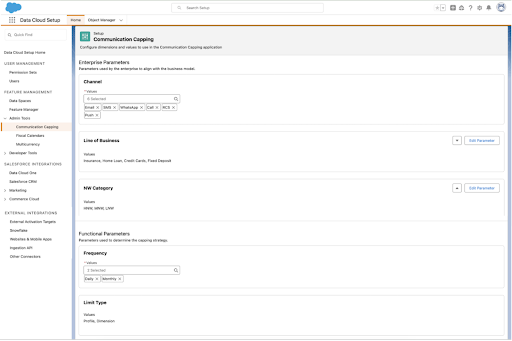
Rules-Based Communication Limits
The admin can then set communication caps per customer profile or channel. Note that communication caps cannot be set at the contact level. The rules can be created from scratch or imported from a file, and they are created with a validity period allowing businesses to program rules into the future. The admin then creates specific Activation Targets and assigns the dimension metadata to them.
Once the marketer creates, publishes, and activates the segments, the Funnel module kicks in and evaluates the audience based on the rules that have been created.
It’s important to note that this is activation-based capping on a first-come, first-serve basis: the rules apply only at activation, without forecasting future sends, which means lower-value messages can prevent high-priority messages from reaching the audience.
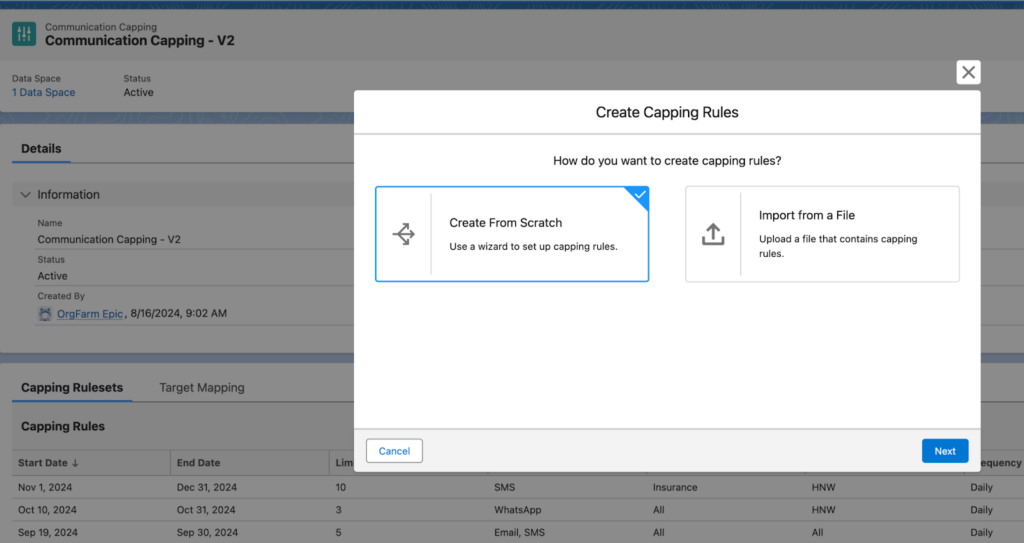
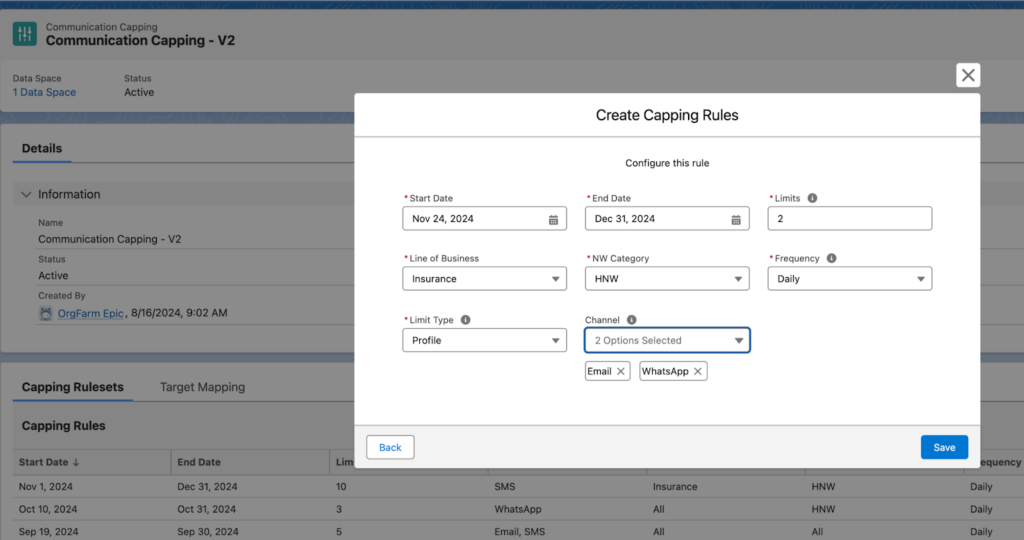
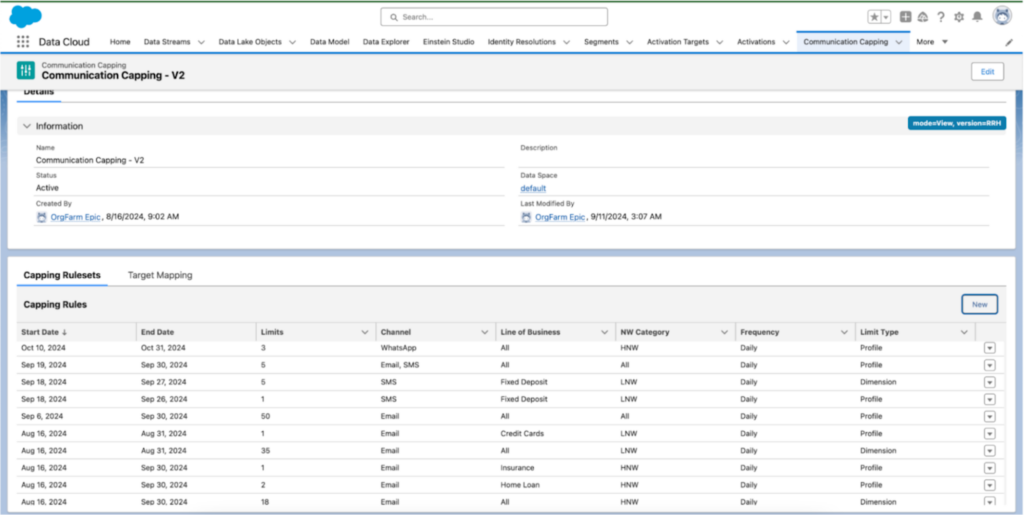
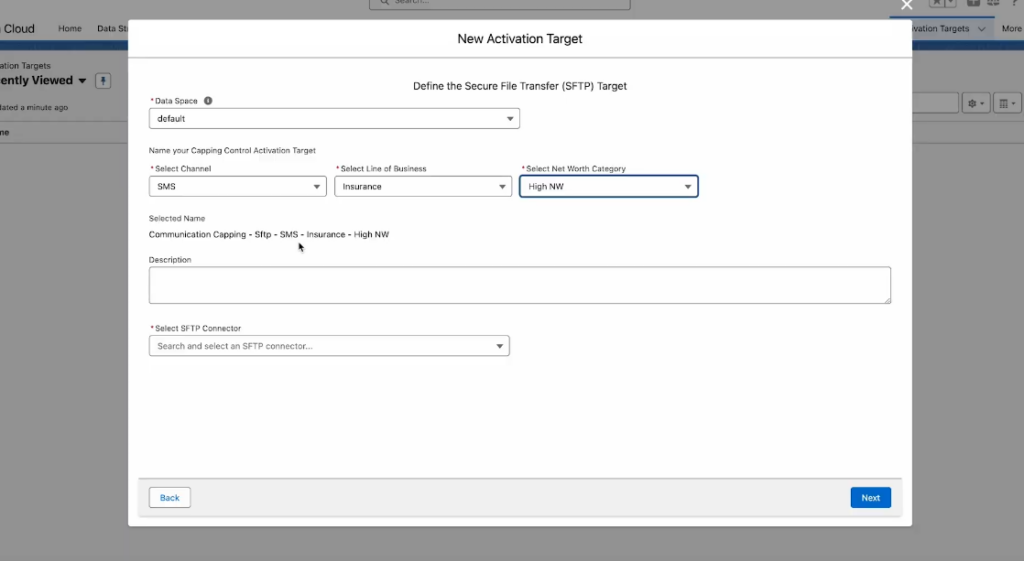

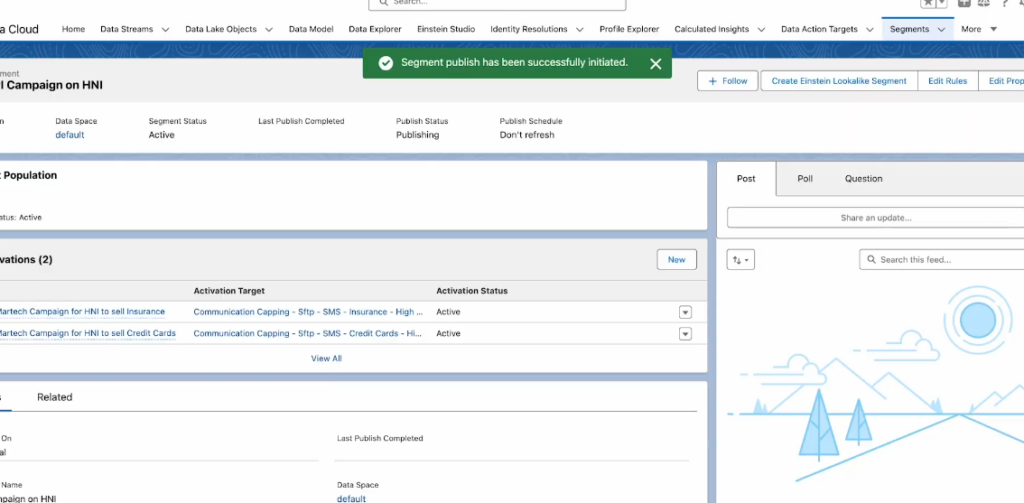
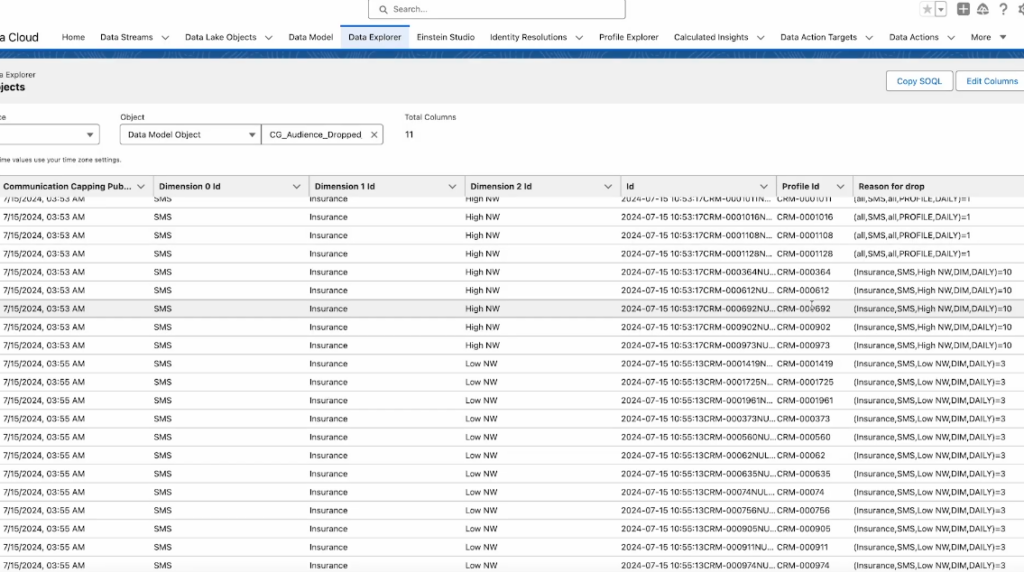
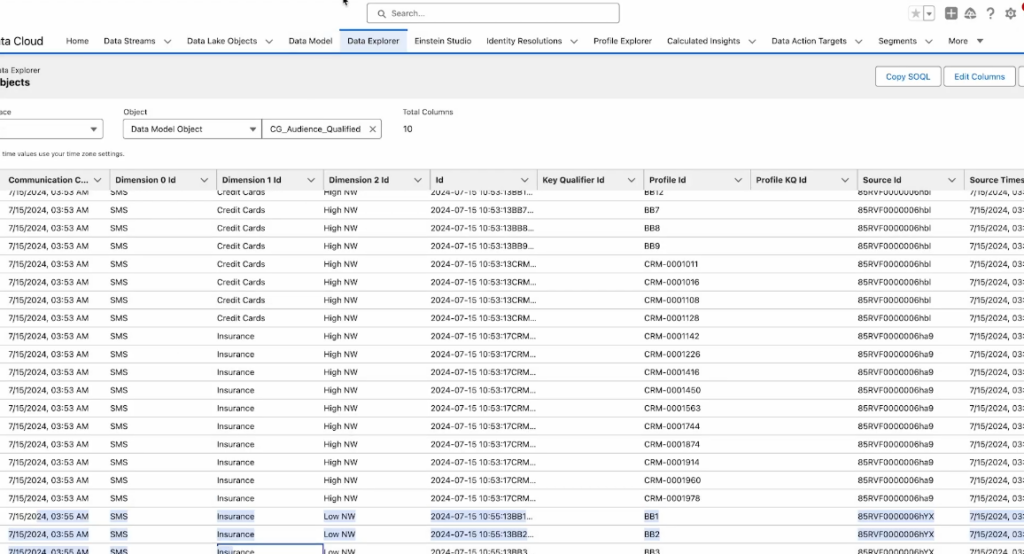
Basic Auditing Capabilities
When the communication capping rule is violated, the Dropped details trigger an audit log that is useful for compliance tracking and audit procedures.
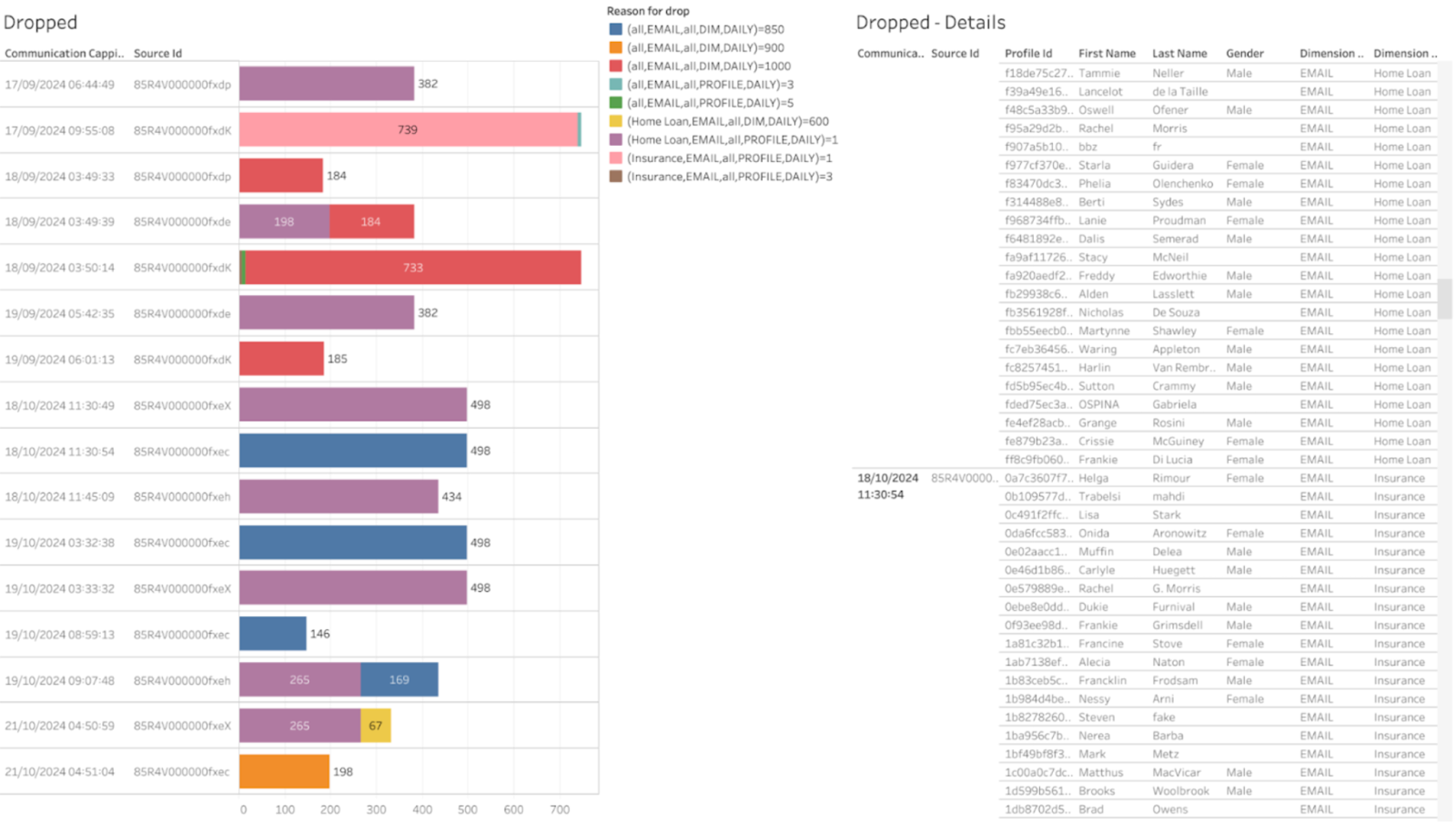
How DESelect Engage Goes Beyond Salesforce Communication Capping
DESelect Engage is a powerful communications prioritization solution within the DESelect Marketing Optimization Platform (MOP) that enables marketing operations and campaign planning teams to prioritize and plan campaigns that result in premium customer experiences that drive revenue, brand loyalty, and ROI.
Engage is an intuitive drag-and-drop send frequency optimization and saturation control tool that allows marketers to define a set of rules that optimize the amount of communications a contact receives. By optimizing the level of engagement at the contact level, marketers can achieve the just-right “Goldilocks” zone between oversaturation and under-engagement along with a cohesive strategy across segments and channels.
Get an Edge Over Salesforce Communication Capping
Advanced Prioritization Logic
DESelect Engage prioritizes campaigns based on complex rules and takes future campaign sends into account. Unlike Salesforce Communication Capping, which operates on a first-come, first-serve basis where a low-priority message could block a high-value one, DESelect Engage ensures high-value messages get through. In other words, marketers using Salesforce Communication Capping have limited control over which messages are delivered when the caps are hit.
Furthermore, while Salesforce Communication Capping focuses on multi-channel limitations, Engage takes an omnichannel approach to optimize communication and ensure a seamless customer experience across email, SMS, push, and custom channels.
With DESelect Engage, marketers stay in control. The following features showcase how Engage goes beyond simple communication capping to deliver truly optimized communications:
- Customized prioritization rules based on business goals, customer engagement scores, and forward-looking campaign spend.
- Ability to define and control frequency based on campaign types, contact category, and channel.
- Intelligent prioritization to determine which messages should take priority when frequency caps are reached, while also giving marketers the flexibility to ignore rules if an urgent, ad-hoc, or high-value communication needs to be sent.
- Together, these features take customer engagement to a new level. Unlike Salesforce Communication Capping, where each profile in the aggregated audience is processed sequentially, DESelect Engage does not take a hierarchical approach. Instead, Engage offers flexible and intelligent prioritization rules to not just ensure subscribers are not oversaturated, but to also ensure they are not under-engaged.
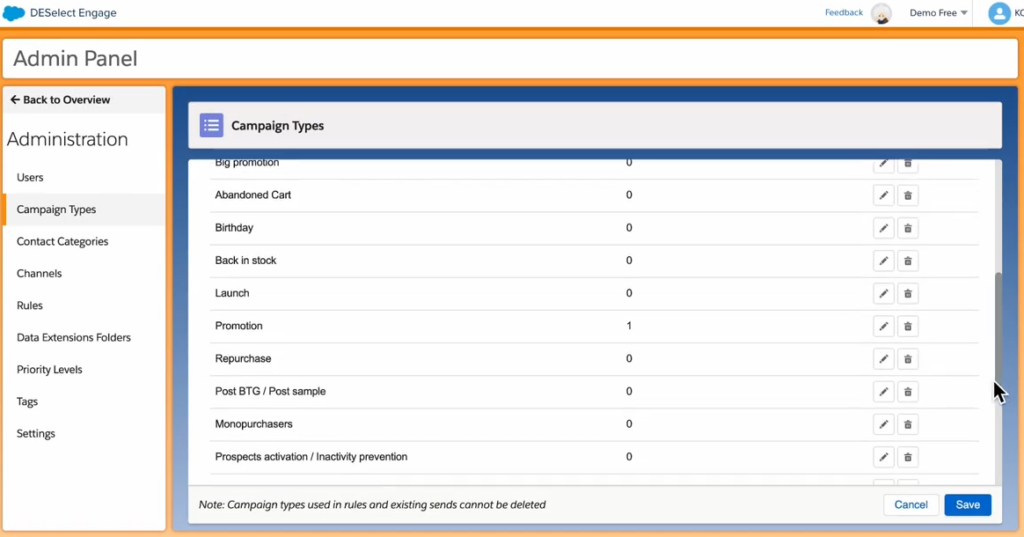
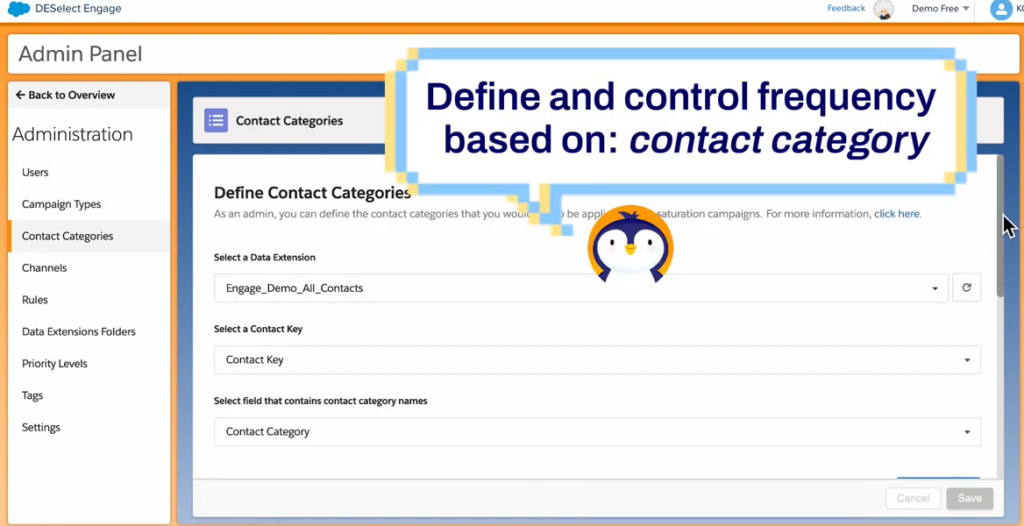
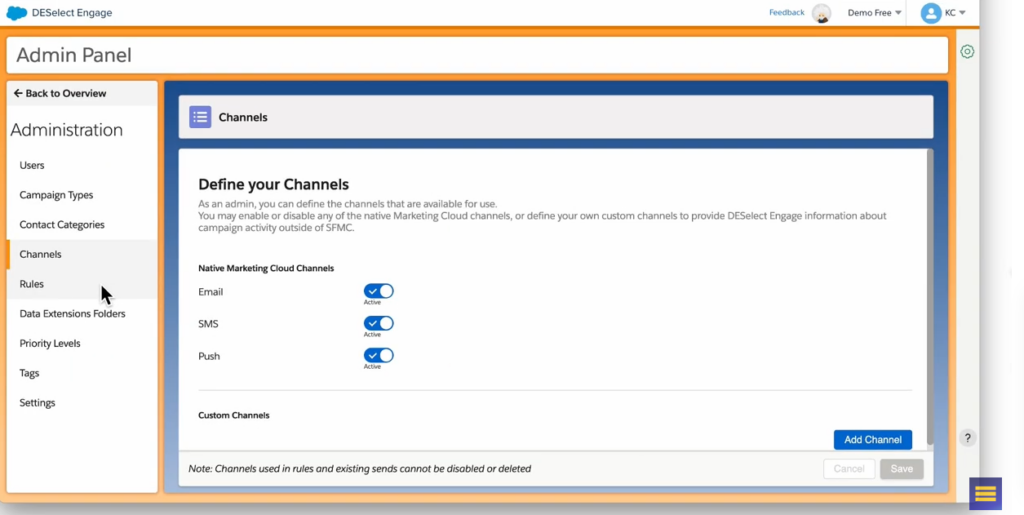
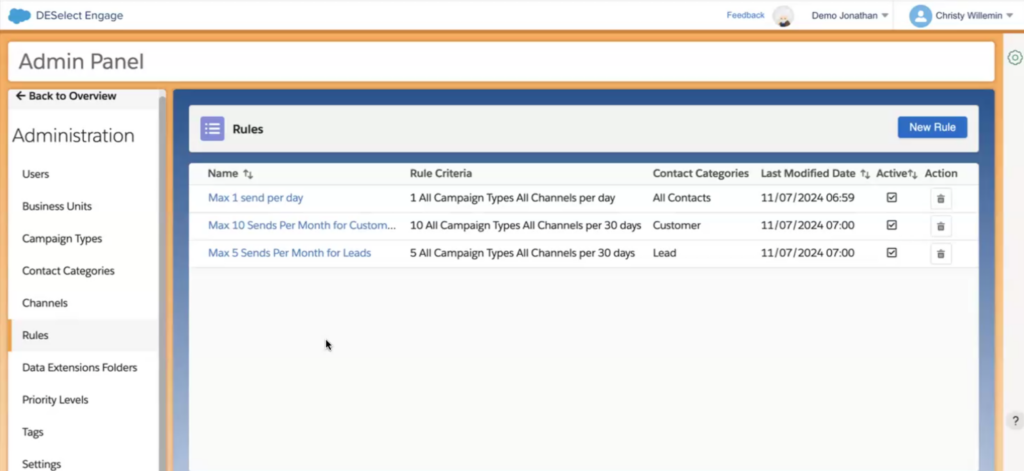
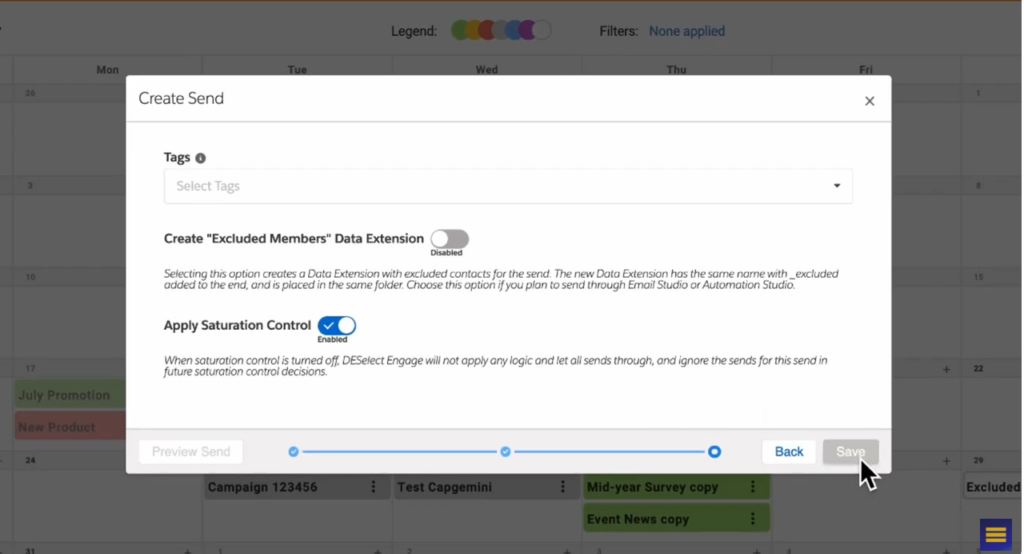
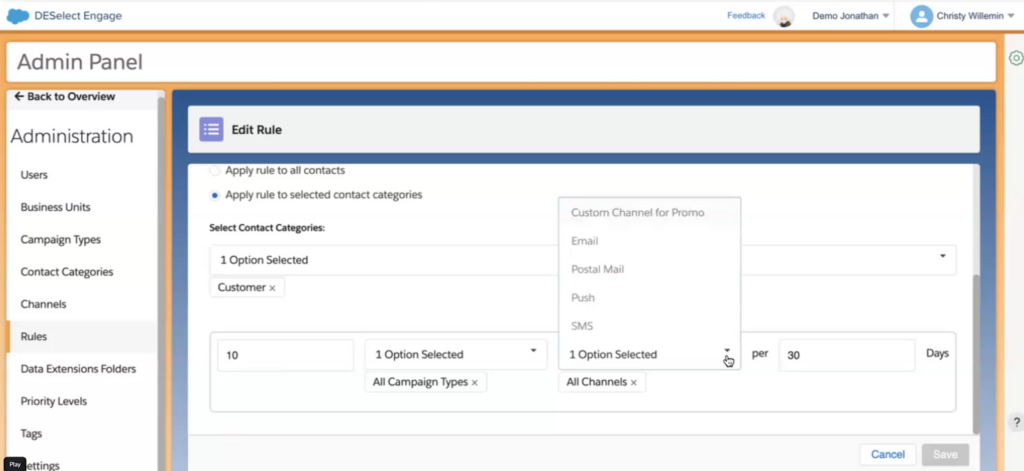
Holistic Campaign Management and Visibility
Unlike Salesforce Communication Capping, which manages limits on a per-segment basis, DESelect Engage provides an optional calendar-based approach that allows marketers to see the entire communication landscape and orchestrate communications across all campaigns and channels at the contact level. This integrated approach ensures the right person gets the right message at the right time via the right channel.
- Engage ensures messages are delivered to the right person at the right time based on subscriber behavior, creating an engagement-first strategy instead of a capping-first strategy. Engage also takes into account future sends, versus Salesforce’s Communication Capping “backward-looking” only capability.
- Marketers get unparalleled campaign visibility with the ability to track all active campaigns in one place and optimize communication frequency accordingly.
- Using drag-and-drop, marketers can plan sends directly from the visual calendar and see how they will impact saturation. As new campaigns are created or are moved to different dates, the impact on marketing frequency is recalculated, opening up a much better way to prioritize communications across all campaigns, channels, and audiences.
- Engage prevents campaign and communication collisions by ensuring alignment between planned messages and customer engagement data.
- As mentioned earlier, campaign leaders get the flexibility to send ad-hoc or high-priority communications—directly from the calendar view—and specify whether each send should use or ignore the rules that have been defined.
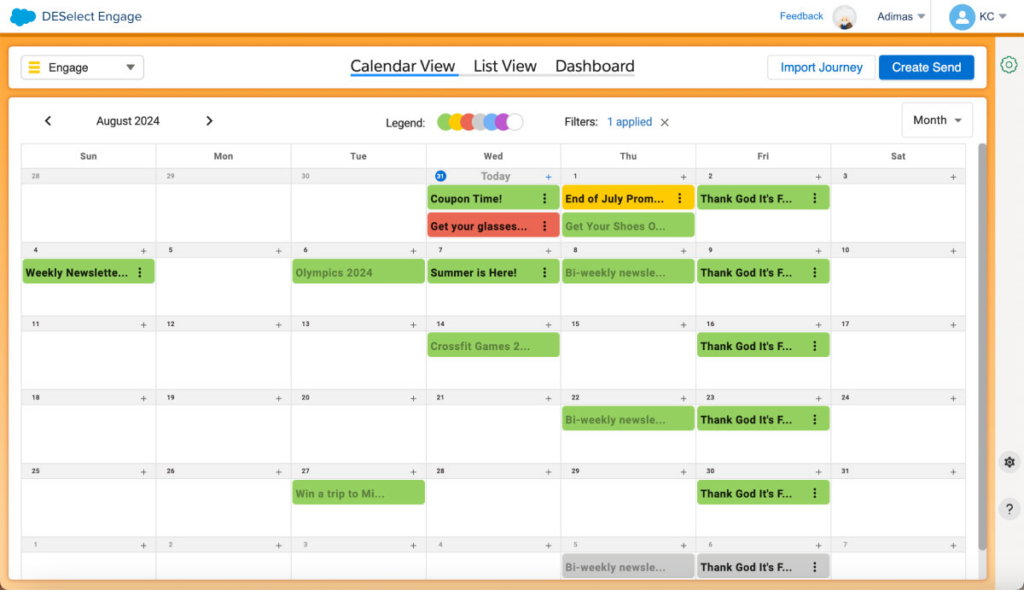
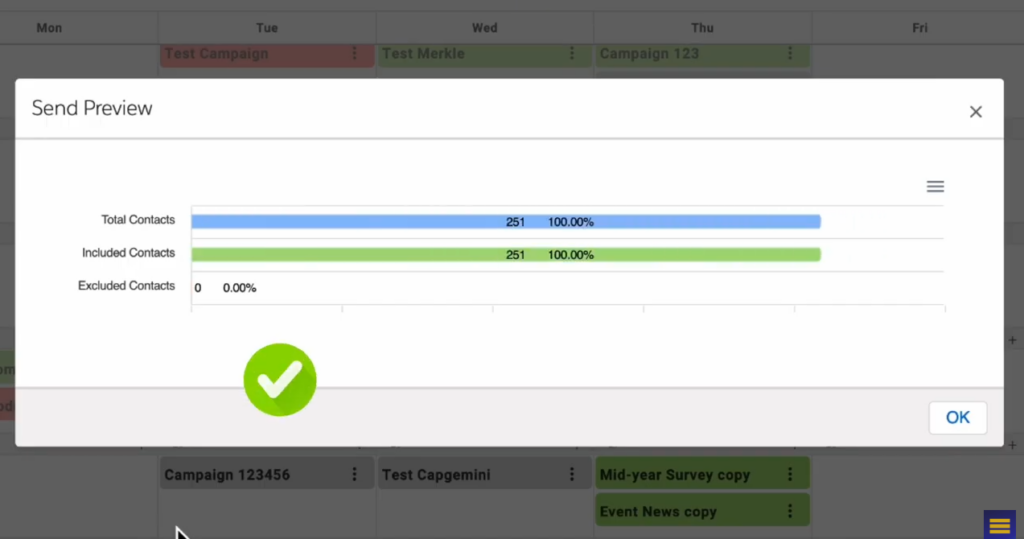
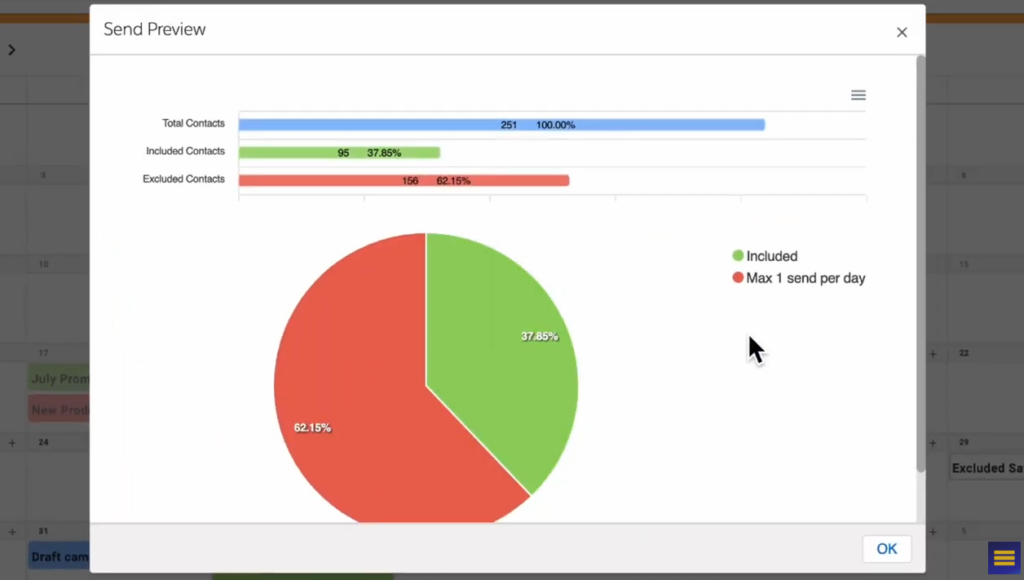
Reporting and Insights for Data-Driven Decision-Making
Engage has strong audit logging but goes beyond Salesforce Communication Capping audit logs to provide marketers with data-driven insights into communication performance and optimization opportunities. Real-time dashboards that monitor communication frequency, audience saturation, and engagement trends across all channels—combined with the calendar view—enable campaign teams to adjust communication strategies for improved efficiency and easier compliance.
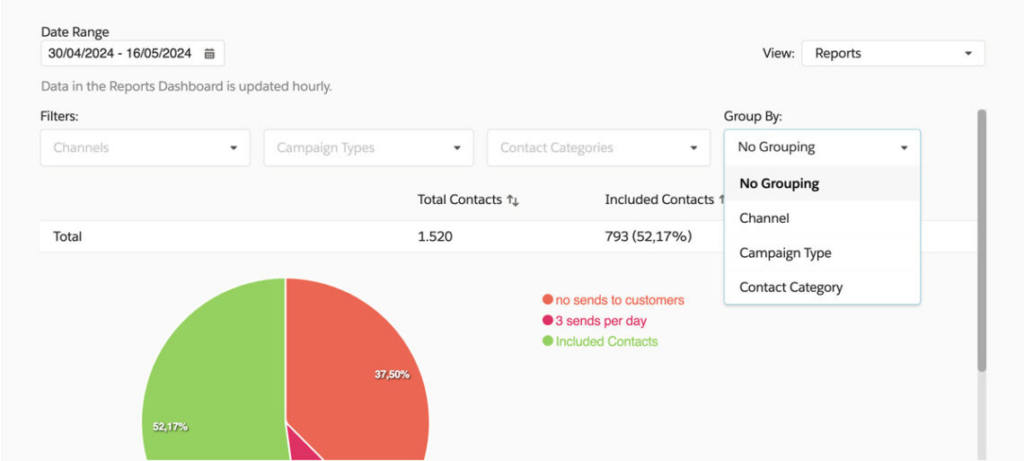
Professional Services: Strategic Guidance for Marketing Teams
To help enterprises get on a fast path to prioritizing communications, DESelect offers professional services for Engage. This expert guidance helps marketing teams define and refine their communication strategies to achieve fast time to value and eliminate or reduce any reliance on IT. These services include:
- Strategic workshops to develop tailored communication strategies and cadences.
- Hands-on implementation support for configuring Engage for optimal use.
- Customized training and best practices guidance to take advantage of advanced features in Engage.
- Ongoing advisory sessions to review, adjust, and optimize communication strategies based on performance data and evolving customer needs.
The Business Impact: Why Marketing Ops Leaders Choose Engage
DESelect Engage significantly improves customer engagement by allowing marketing teams to monitor and control communication saturation in real-time, optimize messaging frequency, and enhance cross-team collaboration. Customers have reported increased email deliverability, reduced unsubscribes, higher overall campaign effectiveness, and optimized revenue due to better-managed communication strategies. Unlike Salesforce Communication Capping, DESelect Engage delivers:
✅ Visibility and Insights
Only Engage offers a single, holistic system and calendar that provides unprecedented visibility and control across all campaigns, so you can send the right message to the right person at the right time via the right channel, eliminate campaign collisions, and quickly act on insights from campaign planning data.
✅ Premium Customer Engagement Experiences
Only Engage enables ROI-focused marketing by finding the best frequency for just-right engagement levels based on an individual subscriber’s behavior.
✅ Compliance
Only Engage enables true control over marketing saturation to fortify your compliance framework and safeguard your organization’s reputation.
Customer Success Story: The Brain Tumour Charity
The Brain Tumour Charity, a non-profit organization based in the United Kingdom, sits at the heart of a diverse community, serving donors, corporate sponsors, researchers, and those who live with or have had brain tumors, along with their loved ones. The marketing team struggled with manual campaign processes that provided poor visibility into how the frequency of sends affected individual contact saturation levels.
The team implemented DESelect Engage and has achieved optimized donations that further the organization’s cause. Here’s a snapshot of how the marketing team uses Engage:
✅ Monitors saturation by individual contact, ensuring a personalized cadence and acting on insights to create expanded campaign strategies.
✅ Monitors “always on” campaigns and journeys with predefined rules, ensuring subscribers are only sent the right amount of communications within a certain time frame.
✅ Uses the intuitive drag-and-drop calendar view to find optimal times for ad hoc sends and understand the impact of changes on customer journeys.
✅ Manages the customer experience by prioritizing campaigns and avoiding campaign collisions, saving considerable time compared to the clunky contact strategy that was previously used.
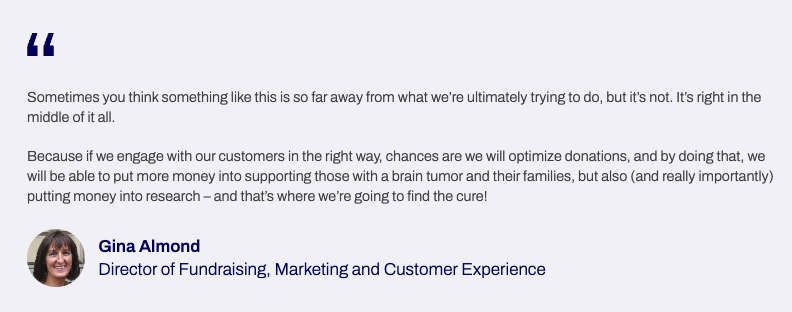
Conclusion: Choose Engage for Smarter Communication Capping
As consumers become increasingly selective in their interactions with brands, understanding your audiences’ messaging preferences is critical to optimizing engagement and fostering loyalty. If you get message frequency wrong, you risk damaging the customer relationship with marketing fatigue, wasting precious marketing resources, and putting your organization at risk for non-compliance with messaging regulations.
While Salesforce Communication Capping provides basic frequency capping controls, it lacks the strategic depth modern marketers need to prioritize communications. DESelect Engage delivers a smarter, cross-channel, and holistic solution that enables marketers to see the entire communication landscape, maximize engagement while ensuring compliance, and build a cohesive strategy across segments and channels.


